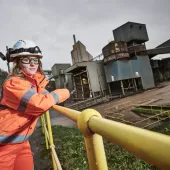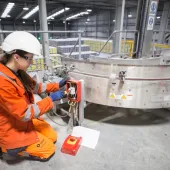How Leadership Influences Positive Behaviour

First published in the July 2018 issue of Quarry Management
Latest in a series of quarterly articles relating to the IQ’s four Skills Wheel themes. This month: Engagement, Influence and Impact - and the importance of good leadership in motivating and inspiring others to do tasks well
In leadership, people and relationships are more important than tasks. Tasks do matter, but the main role of a good leader is to motivate and inspire other people to do tasks well. So, what are the good leadership initiatives that help drive and positively reinforce the winning behaviours helping unlock positive change management in the mineral extractives and quarrying sector?
The Institute of Quarrying’s ‘Engagement, Influence and Impact’ segment of its Skills Wheel considers how quarrying and mineral extractives professionals should aim to work within teams and the wider communities and networks. It covers a multitude of disciplines – from coaching and mentoring to understanding your team, as well as leadership behaviours - all of which contribute positively to engagement, influence and impact.
James Thorne, IQ’s chief executive officer, said: ‘In our role as the professional membership body responsible for the continuing personal development of people working in the mineral extractives and quarrying sector, we see it as our responsibility to take the lead on leadership.
‘There are many different styles of leadership and they can (nearly) all be good. The important thing is to be yourself: know your own personality so that you can be authentic in the way you engage with other people and the way you use your authority. Understand how you as an individual can best have positive impact and influence with others, and try to understand how they perceive you. And always be clear in communicating your values, what you care about and what you stand for – through your behaviour as well as your words.’
Leading by example, IQ Academy has set out its stall with a series of compelling ‘Lunch and Learn’ webinars. Julian Smallshaw is IQ’s head of educational development. He explained: ‘IQ Academy is our training academy. It provides a truly flexible approach to learning for both individuals and companies. We tailor programmes for operators all over the world that suit particular local needs and use a combination of delivery methods, including online modules, face-to-face sessions and formal assignments.
‘Leadership is a subject that is very much of the moment. It’s all pervasive – in politics, in industry, in sport. In our industry it’s equally high profile, and rightly so. It makes it the perfect subject for IQ Academy’s ‘Lunch and Learn’ webinar in August, which looks at empowering people through great leadership to achieve winning behaviours.’
IQ’s ‘Lunch and Learn’ webinar ‘Empowering People through Great Leadership’ will run between 12.30-13.00 on 30 August 2018. The half-hour presentation will explore the concept of leadership, the different styles of leadership, and look specifically at areas of weakness in the minerals extractive and quarrying sectors, and what the industry can do to improve.
Mr Smallshaw continued: ‘There’s no golden bullet when it comes to great leadership, but what we can do is commit to incremental gains that will, over time, result in a step change in the industry. We need to get better at defining clear goals, delegating, providing feedback; and only then will we get better if we confront issues head on and at all levels.’
So, what are the good leadership initiatives that help drive and positively reinforce the winning behaviours helping unlock positive change management? And why are they so important in the minerals extractive sector?
Viv Russell is group managing director of Longcliffe Group Ltd, one of the largest producers of high-quality calcium carbonates in the UK. The company extracts, processes and delivers 1.6 million tonnes of limestone and dolomite products every year. He understands that strong leadership is essential if the industry is to achieve its goal of Zero Harm safety performance, and he has worked with IQ to develop a new fact sheet about leadership and how behaviour supports zero harm safety performance.
Mr Russell explained: ‘Over the past 20 years various types of safety management initiatives have been applied to the industry. In the UK from 2000 to 2010, the initiatives of Hard Targets and Target Zero achieved a 76% reduction in injuries, but have since plateaued. The explanation for this is that the industry has moved through various stages of safety learning to improve site safety; achieving further improvements demands that we address the behaviours of people on site.
‘Sites that have achieved exceptional periods with a ‘Zero Harm’ performance have the defining factor of a strong visible safety leadership within all levels of management and supervision. This leadership drives the individual mindset and behaviour change to achieve a ‘Zero Harm’ performance.
‘You need to understand the psychology of employees/contractors’ behaviours, mindsets and the beliefs that craft and evolve them to understand this. Every individual has their own set of beliefs, which are a combination of their experiences, learning and personal interpretation of events.
‘The way a leader, manager or supervisor interacts with the individual will influence this evidence gathering and thus the individual’s beliefs. This is why all levels of leadership must demonstrate and interact with critical behaviours to reinforce positive safety beliefs and question negative beliefs, creating good unconscious safety habits by driving correct behaviour and mindsets.’
There are many attributes and behaviours that make a good leader, including ability to:
- create a culture of engagement
- use your physiological strengths
- adapt to your environment
- model excellence by adopting good practice
- visualize success
- believe in yourself
- be positive
- be challenging
- focus on solutions
- regard excellence as normal
- set inspiring goals.
Viv Russell concluded: ‘These critical leadership behaviours have been identified and often described as ‘Winning Behaviours’. Some managers/supervisors demonstrate them naturally and are well developed, but they can be taught and adopted throughout an organization/site. Where successful, it has been seen that leadership with ‘Winning Behaviours’ can be a foundation that not only delivers outstanding safety performance, but also customer satisfaction and strong financial growth through good change management.’
For more information about the IQ Skills Wheel or to download IQ’s new ‘How Behaviour Supports Zero Harm Performance’ fact sheet, visit: www.quarrying.org
- Subscribe to Quarry Management, the monthly journal for the mineral products industry, to read articles before they appear on Agg-Net.com








